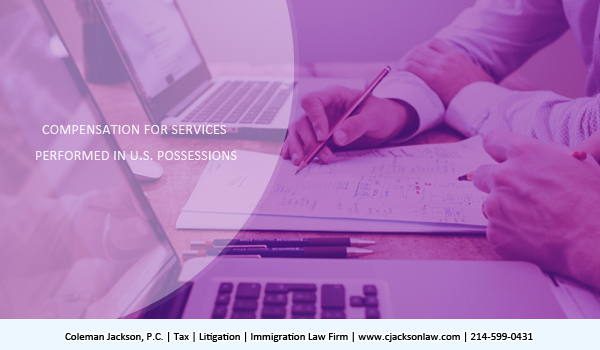By Coleman Jackson, Attorney, CPA
May 30, 2017
The term wages are defined in 26 U.S.C. Sec. 3401 as all remuneration (other than fees paid to a public official) for services performed by an employee for his employer, including the cash value of all remuneration (including benefits) paid in any medium other than cash; except that such term shall not include services performed under certain circumstances. A lot of special circumstances are listed in this tax statute; but in this blog, we will focus on only a few of the circumstances where compensation for services performed as an employee are not wages and, are therefore, excluded from an employee’s gross income for federal tax purposes. The terms employee and employer are very broad terms, and are not precisely defined in American law. The United States Supreme Court in a case styled, United States v. Silk, 331 U.S. 704, 716 (1947) established several relevant factors in determining whether a worker is an employee or independent contractor (self-employed). Some of the relevant factors on the Silk list indicating that a worker is an employee versus independent contractor are the degree of control the employer has over the worker’s results and procedures in achieving those results, the degree to which the worker can realize a profit or loss, the degree to which the worker must personally perform the work or is permitted to hire helpers (commonly known as sub-contractors); the degree the worker has investment in facilities, equipment and other assets for performing the work, and the degree of permanency of the relationship. This list is not exhaustive; the critical test is to what extent the employer can control the results and the means of achieving the results. The Silk list is called the common law test. The common law test was codified in U.S. tax law in Treasury Regulation 91 and also the State of Texas has codified the Silk test in the Texas Labor Code and the Texas Tax Code for employer-employee situations and payroll tax matters. Wages paid to employees are, typically included in the employee’s gross income for tax purposes and typically American employers must withhold appropriate withholding taxes from employees’ wages. This blog identifies and discusses several circumstances when wages earned by employees are not subject to federal income tax.; therefore, employers do not withhold federal income taxes, nor does the employee include those wages in their gross income. Although we try to make this blog very reader friendly, the reader must not lack the understanding or forget that terms employer and employee can be the subject of intense disagreement with enormous tax and legal consequences. The proper classification of employment relationships are not determined by a single factor or even multiple factors, but by the economic circumstances as a whole.
Payment for services performed outside of the United States by a United States citizen are excluded from an employee’s wages under Internal Revenue Code Sec 3401(a)(8)(B). Internal Revenue Code Sec 911(a) (2) provides, in part, that where a United States citizen is present in a foreign country for 18 consecutive months or countries during at least 510 full days in the tax period, any amounts paid, other than by the United States or its agency, for earned income attributable to services performed during such 18 month period is excluded from the individuals gross income. The worker must make an election to exclude such wages pursuant to 26 USCS Sec 911(a) (2) on IRS Form 2555 or on a comparable form which is filed with the taxpayer’s federal income tax return or amended tax return for the first year of the individual for which the exclusion election is to be effective.
Payment for services performed on behalf of a foreign government by a United States citizen are excluded from an employee’s wages under Internal Revenue Code Sec 3401(a)(5). 26 U.S.C Sec 893(a) excludes wages, fees or salary of any employee of a foreign government or of an international organization (including a consular or other officer, or a nondiplomatic representative) received as compensation for official services to the foreign government or international organization. In Abdel-Fattah v. Commissioner, 134 T.C. 190 (2010), the U.S. Tax Court ruled that certification under 26 U.S.C. 893(b) by the U.S. State Department is not a prerequisite for the Sec 893(a) exemption of earned income paid by a foreign government. The exemption from federal U.S. taxation of such wages paid by foreign governments is also exempt from federal income tax withholding statutes which means that the foreign government or international organization does not have any tax withholding obligations.
Payment for services performed by a United States citizen qualifying for the Foreign Earned Income Credit are excluded from an employee’s wages under Internal Revenue Code Sec 3401(a)(8)(A). The tax policy behind the foreign earned income tax credit is to avoid double taxation that would occur, but for, this foreign earned income tax credit, when U.S. citizens’ foreign source income (income earned abroad) is taxed by both the United States and the foreign country where the citizen works or earns the income. Taxes paid or accrued to a foreign country or a U.S. possession, also known as U.S. territory, qualifies for the foreign income tax credit. Also certain payments in lieu of income taxes paid or accruing to a foreign country or U.S. territory qualifies for the foreign earned income credit. Foreign earned income can be taking by the taxpayer as a credit or deduction, but not both. The basic policy behind the foreign earned income credit is avoidance of double taxation of foreign sourced income earned by U.S. citizens. As in tax law in general, there are exceptions to these general rules.
Payment for services performed by a United States citizen subject to foreign or U.S. possession withholding tax are excluded from an employee’s wages under Internal Revenue Code Sec 3401(a)(8)(A)(ii). The basic tax policy behind exclusion of income earned by U.S. citizens subject to foreign or U.S. possession withholding tax is the same as for foreign earned income tax credit; namely, the relief desired is avoidance of double taxation of U.S. citizen’s earned income that is subject to foreign taxation or taxation in U.S. territories. U.S. territories include Puerto Rico, Northern Mariana Islands, American Samoa, Guam and various Islands, such as, Navassa Island, Wake Island, Baker Island and a couple other Islands in the Pacific Ocean, known as U.S. Minor Outlying Islands.
Gleaned from reading the U.S. Congressional historical record for these various gross income exclusions by U.S. citizens of income earned as employees of foreign governments or while working abroad are designed to avoid double taxation of U.S. citizens. In the legislative records, Congress expresses the sentiment that the exemption policy is one further step toward increasing our foreign trade by excluding from gross income in case of U.S. citizens employed abroad in selling their merchandise amounts received as salary or commission for the sale for export of tangible personal property produced in the United States in respect of such sales made while they are actually employed outside the United States. The U.S. Senate record gives the following justification for such policies:
“For example, many employees of American business in South America do not return to the United States for periods of years. Such persons are fully subject to the income tax of the foreign country of their residence.” See Senate Report No. 1631, 77th Congress 2d Session 54 (1942).
These types of tax policies are simply designed to remove impediments and national barriers holding back American citizens in fully participating in the global market place with their peers from other countries.
This law blog is written by the Taxation | Litigation | Immigration Law Firm of Coleman Jackson, P.C. for educational purposes; it does not create an attorney-client relationship between this law firm and its reader. You should consult with legal counsel in your geographical area with respect to any legal issues impacting you, your family or business.
Coleman Jackson, P.C. | Taxation, Litigation, Immigration Law Firm | English (214) 599-0431 | Spanish (214) 599-0432






